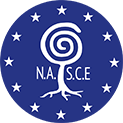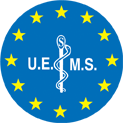- Is it correct that only surgical training centres can apply for NASCE accreditation?
- Definitely not, 21 sections of UEMS have approved NASCE Accreditation Program and are supporting NASCE http://nascenet.org/structure/council
- Can commercial training centres apply for NASCE accreditation?
- Yes, as long as these centres are affiliated with a Local University and/or Local Hospital
- When and why was NASCE founded?
- The integration of alternative training modalities to improve safety within healthcare is increasing and will become progressively part of training, assessment, research and process improvement infrastructure of all disciplines. As there was a need for an official organization in Europe to accredit medical training centres, NASCE was officially founded under the umbrella of UEMS in 2015
- What specialties within UEMS have recognized NASCE?
- 21 different sections of UEMS have recognized NASCE Accreditation System. For details of these sections: http://nascenet.org/structure/council
- Who can apply for NASCE application?
- Any centre with an appropriate steering board that offers consisted, planned, collaborative and integrated alternative training modalities (assessment, research, teaching activities) to improve clinical care, patient safety and/or outcome metrics across the healthcare system.
Centres can be accredited to two levels (single specialty or multispeciality format centre) upon meeting standards set under six headers (Governance, Administration , Teachers , Learners Competencies , Research and Development) - NASCE accredits the centre but does not accredit specific skills courses or content per se. Accreditation is an on-going process of development and yearly membership of NASCE is required if accredited status is used in any documents related to the centre. http://nascenet.org/accreditation/application
- Any centre with an appropriate steering board that offers consisted, planned, collaborative and integrated alternative training modalities (assessment, research, teaching activities) to improve clinical care, patient safety and/or outcome metrics across the healthcare system.
- What is the benefit for my centre to become an accredited NASCE centre? = Why should a centre apply for NASCE accreditation?
- SWOT analysis of the centre and constructive feedback from NASCE council based upon the site visit by two Accreditation Review Board members
- Opportunity for networking within Europe
- Sharing experience & knowledge with other accredited centres
- Accreditation may lead to increased recognition internationally by non-commercial and commercial organizations
- Active participation at yearly NASCE congress
- Can a centre focussing on CRM training also apply for NASCE accreditation?
- Yes definitely, because during CRM training, different types of alternative training modalities such as simulation based education are being used and a variety of healthcare providers are being trained and assessed to improve overall safety in daily practice. Furthermore research in this field is increasingly popular. Just be aware that NASCE is not accrediting the content of the training sessions but the overall organization and centre behind it.
- What is the difference between a single specialty and multi specialty accredited centre?
- If a center focuses only on one discipline such as anaesthesiology, it is considered as a single specialty centre. Centres focusing on more than one specialty are considered as multispecialty centres.
There are minor differences in the accreditation criteria for these two types of centres. http://nascenet.org/accreditation/application
- If a center focuses only on one discipline such as anaesthesiology, it is considered as a single specialty centre. Centres focusing on more than one specialty are considered as multispecialty centres.
- Can a centre apply if not all the criteria have been fulfilled?
- If a centre fulfils most criteria, the ARB (Accreditation Review Board) will review the report of the ARB visitors to the centre and based upon consent a temporary accreditation for one year may be granted with the obligation to fulfil “all” required criteria before the end of that year.
- What does the accreditation entail?
- The accreditation process will include:
- Completion of a Application Form for Accreditation
- Review by NASCE Council
- Site visit by two ARB surveyors after signing confidentiality agreement
- Review of the report the two surveyors to ARB and NASCE council
- Decision by the NASCE council
- Decision and constructive feedback sent to centre by NASCE council
- The accreditation process will include:
- Is it possible that a NASCE member reviews the application of the centre prior to submission?
- Currently this service is not provided by NASCE.
- Is there a course or orientation we can take before applying?
- Currently this service is not provided by NASCE.
- But any questions can be sent to the NASCE secretary NASCEsec@outlook.com
- Requiring a site visit is cost extra money for the applying centre. Is it necessary that this is included in the accreditation process?
- Indeed it may be regarded as costly but the purpose of the site visit is to clarify the following:
- Site characteristics – can only be identified by observation
- Outcomes – by speaking with the learners, observing training sessions or videos
- Organizational structure and financial support by meeting the key individuals.
- Indeed it may be regarded as costly but the purpose of the site visit is to clarify the following:
- How long will the centre be accredited for?
- The maximum time for accreditation by NASCE is 4 years with annual reports.
- What do the fees include that every centre has to pay when applying for accreditation?
- The fees cover survey expenses and allow for reinvestment in the mission of accreditation. In addition to the stated fees, the centre is also responsible to cover the travel expenses of the surveyors.
- How is confidentiality about research projects guaranteed during a site visit?
- Prior to start the visit of the centre, the two ARB surveyors will sign two copies of a confidentiality agreement and hand one to the centre director and one will kept by the NASCE secretary.
- The Application Form for Accreditation will be reviewed by the NASCE council and the two ARB surveyors.
- What are the possible NASCE accreditation decisions?
- Not accredited
- Fully accredited for 4 years
- Temporary accreditation for one year with the obligation to fulfil “all” required criteria before the end of that year.
- If my centre was not accredited, when can we reapply?
- In order to assure centres have had the appropriate time to fulfil all criteria, centres must wait one year from the NASCE council decision.
- Is there an appeal process if my program is denied accreditation?
- Yes, an appeal may be done in writing to the ARB, and the decision will be reviewed by external experts within the UEMS.
- Does NASCE accredit workshops?
- No, NASCE only accredits centres not the courses. The various sections of the UEMS do this.
- Is there a list of NASCE accredited centres?
- Yes indeed, the list can be reviewed on the webpage: http://nascenet.org/accredited-centres
- What is the difference with other accreditations of educational centres?
- The differences of NASCE with other accreditation programs (SSH, ACS ...) are the following:
- NASCE accredits centres with different specialties in contrary to systems accrediting only surgical training centres.
- As NASCE is functioning under the umbrella of UEMS, NASCE accreditation is a governmental system compared with accreditation systems given by associations.
- The differences of NASCE with other accreditation programs (SSH, ACS ...) are the following:
- Will it be possible to present the research conducted by our training centre? Will this translate into a higher chance of publication into a journal associated with NASCE?
- Abstracts of the research conducted at the accredited NASCE centre can be submitted yearly to the NASCE secretary. The local organizing committee supported by the NASCE council will decide if abstracts will be accepted for oral or poster presentations. The best five abstracts will be eligible to enter into a prize competition. At the moments, there is no official journal for NASCE.
- Will members of an accredited NASCE institution have access to reduced registrations fees at the annual NASCE congress?
- Yes, participants coming from NASCE accredited centres have reduced registration fees at scientific activities of NASCE.
- Our centre is not based in Europe; can we still apply for NASCE accreditation?
- The NASCE council will handle each decision individually. But the documentation for review must be submitted in English, and the surveyors will require your centre to provide someone with knowledge of the centre who is fluent in English as well as your primary language to translate for the surveyors.
- For centres outside the UEMS area the surveyors are entitled to a business class flight. The centres should be within 2 hours safe travel from a major airport hub as well as appropriate 4 star accommodations or equivalent. Domestic travel to be organized and paid by the applying institute (for more information; www.nascenet.org, pdf document ”process of accreditation”) .

